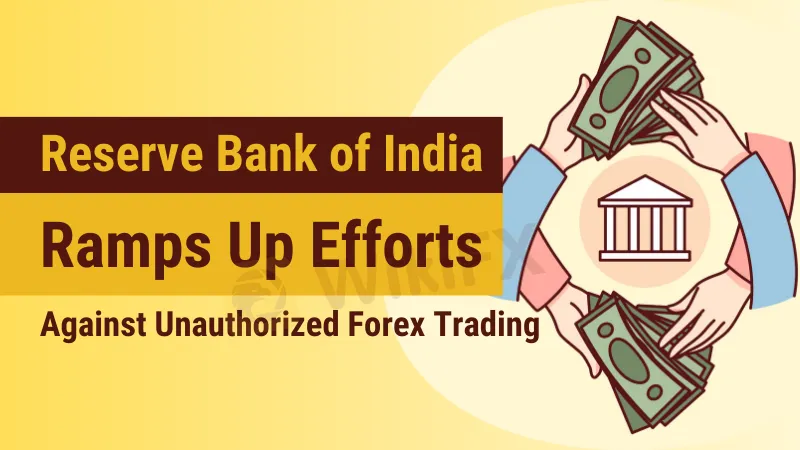简体中文
繁體中文
English
Pусский
日本語
ภาษาไทย
Tiếng Việt
Bahasa Indonesia
Español
हिन्दी
Filippiiniläinen
Français
Deutsch
Português
Türkçe
한국어
العربية
Reserve Bank of India Ramps Up Efforts Against Unauthorized Forex Trading
Abstract:RBI takes strict action against illegal forex trading, enhancing KYC norms and using technology for financial stability.

With the explicit intention of safeguarding India's financial stability, the Reserve Bank of India (RBI) has declared a succession of stringent protocols designed to suppress illicit foreign exchange trading. The Economic Times has documented a worrisome increase in unauthorized foreign exchange transactions, which has prompted the development of this strategic initiative.
Enhanced Cooperation and Strict Measures
The RBI is actively engaged in dialogues with a number of banks and government entities in an effort to devise and execute stringent measures that would efficiently deter the unauthorized use of banking channels for foreign exchange transactions. In light of the recent arrests associated with these unlawful activities, this decision underscores the central bank's dedication to preserving the credibility of India's financial systems.
Case Studies Heighten the RBI's Vigilance
Two merchants were apprehended by the Directorate of Enforcement earlier this year on suspicion of engaging in illicit foreign exchange trading. The individuals, situated in Kolkata, possessed an extraordinary 180 bank accounts, which resulted in the confiscation of Rs 120 crore. The proactive approach of the RBI is additionally demonstrated through the compilation of an alert list that includes seventy-five entities, such as unauthorized platforms and websites involved in illicit foreign exchange transactions.
Enhancing the Regulatory Structure
In an endeavor to enhance its regulatory framework, the Reserve Bank of India (RBI) has addressed a letter to stakeholders soliciting recommendations on how to combat illicit foreign exchange trading. In all foreign exchange (FX) transactions, the central bank stresses the critical significance of increased public awareness and stricter adherence to Know Your Customer (KYC) regulations.

Government and Technology Partnership
There have been proposals from bank administrators in both the public and private sectors to integrate supplementary technological controls. The objective of these recommendations is to augment the surveillance and supervision of foreign exchange transactions. The Joint Venture of the Reserve Bank of India (RBI) and the Ministry of Electronics and Information Technology (MeitY) aims to leverage technological progress in order to enhance the detection and prevention of illicit foreign exchange operations.
Legal Consequences and Public Education
Multiple advisories have been issued by the RBI, advising against conducting business with unauthorized platforms and entities and citing potential legal repercussions under the Foreign Exchange Management Act of 1999 (FEMA). Concurrently, the RBI is promoting the implementation of all-encompassing public education initiatives aimed at enlightening the populace regarding the hazards linked to unlicensed electronic trading platforms (ETPs).
Entities on the RBI's Radar
The Reserve Bank of India (RBI) has issued advisories in which it specifically names Alpari, AnyFX, Ava Trade, Binomo, eToro, Exness, Expert Option, FBS, FinFxPro, Forex.com, Forex4money, and Foxroex, urging the general public to exercise caution and diligence.
About the Reserve Bank of India
The Reserve Bank of India, which was founded in 1935, serves as India's highest monetary authority. The Reserve Bank of India (RBI), which is responsible for overseeing the nation's financial sector, is instrumental in developing and executing monetary policy. Furthermore, it exercises authority over the issuance of currency and administers the nation's foreign exchange reserves, thereby promoting growth and economic stability.

Disclaimer:
The views in this article only represent the author's personal views, and do not constitute investment advice on this platform. This platform does not guarantee the accuracy, completeness and timeliness of the information in the article, and will not be liable for any loss caused by the use of or reliance on the information in the article.
Related broker
Read more

Authorities Alert: MAS Impersonation Scam Hits Singapore
MAS scam alert: Scammers impersonate officials, causing $614K losses in Singapore since March 2025. Learn how to spot and avoid this impersonation scam.

Billboard Warns of Crypto Scams Using Its Name – Stay Alert!
Billboard warns against fake crypto scams using its brand. Learn how to spot fraud and protect yourself from fake promotions.

The Impact of Interest Rate Decisions on the Forex Market
Interest rate changes determine currency attractiveness, influencing capital flows and exchange rate trends. Understanding this mechanism helps investors navigate the forex market effectively.

Rising WhatsApp Scams Highlight Need for Stronger User Protections
UK consumers lose £2,437 on average to WhatsApp scams. Revolut demands stricter verification and AI monitoring to combat rising fraud on Meta platforms.
WikiFX Broker
Latest News
The Withdrawal Trap: How Scam Brokers Lure Victims into Paying More
FCA to Investors: Think Twice Before Trusting These Brokers
Trump\s tariffs: How could they affect the UK and your money
Trump gambles it all on global tariffs he\s wanted for decades
TradingView Brings Live Market Charts to Telegram Users with New Mini App
Trump tariffs: How will India navigate a world on the brink of a trade war?
Interactive Brokers Launches Forecast Contracts in Canada for Market Predictions
Authorities Alert: MAS Impersonation Scam Hits Singapore
Stocks fall again as Trump tariff jitters continue
IG Group Acquires Freetrade for £160M to Expand UK Investment Market
Currency Calculator







